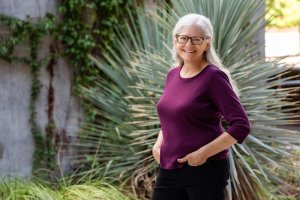Presented By: University of Michigan Biological Station
Mutualism: What Do We Know, and Where Do We Go From Here?
Dr. Judith L. Bronstein, University of Arizona

Mutualism is cooperation among different species. Giving the Pettingil Lecture in Natural History during the 2025 Summer Lecture Series at the University of Michigan Biological Station, Dr. Judith L. Bronstein will review the history of the study of mutualism, a field that has only coalesced in the past 20 years. She will identify six major research directions and present her own recent work on one pollination mutualism to show how these directions can be integrated to move our understanding forward. This is a particularly intriguing interaction because it appears to be exceedingly costly (the offspring of the pollinator moths are voracious herbivores on the same plants), making it an ideal test case for testing our understanding of how mutualisms arise and when they can persist. Bronstein also will discuss a few pressing issues surrounding mutualism that are likely to drive the field in the coming years.
Judith L. Bronstein is University Distinguished Professor of Ecology and Evolutionary Biology at the University of Arizona, with a joint appointment in the Department of Entomology.
She also is an alumna of the U-M Biological Station. She studied at UMBS in 1978.
Bronstein received her A.B. from Brown University and M.Sc. and Ph.D. degrees from the University of Michigan. She joined the University of Arizona faculty in 1989. Dr. Bronstein focuses on the ecology and evolution of interspecific interactions, particularly on mutually beneficial ones (mutualisms). Her career-long goal has been to build a solid conceptual foundation for the study of these poorly understood interactions. Her current projects focus on their intersection with other interspecific relationships, as well as with
intraspecific cooperation.
Bronstein has won numerous teaching awards and has served in leadership positions locally, nationally, and worldwide. She is associate editor of Annual Review of
Ecology, Evolution, and Systematics and natural history associate editor of The American Naturalist; she has served as editor-in-chief of The American Naturalist and as president of the American Society of Naturalists. Bronstein is a Fellow of the Ecological Society of America and recipient of the American Society of Naturalist’s Distinguished Achievement in the Conceptual Unification of the Biological Sciences Award. In 2024, she was elected Member of the American Academy of Arts and Sciences.
The U-M Biological Station — the largest of U-M's campuses at more than 10,000 forested acres surrounded by lakes — is one of the nation's largest and longest continuously operating field research stations.
Founded in 1909, the Biological Station supports long-term research and education. It is where students and scientists from across the globe live and work as a community to learn from the place.
The Summer Lecture Series is a tradition at UMBS, where we explore scientific topics with distinguished guest speakers from across the country so our community can learn about our natural world.
The free, public talks are on Wednesdays from 7 to 8 p.m. in the spring and summer in Gates Lecture Hall at the University of Michigan Biological Station, located at 9133 Biological Rd. in Pellston, Michigan — about 20 miles south of the Mackinac Bridge.
Judith L. Bronstein is University Distinguished Professor of Ecology and Evolutionary Biology at the University of Arizona, with a joint appointment in the Department of Entomology.
She also is an alumna of the U-M Biological Station. She studied at UMBS in 1978.
Bronstein received her A.B. from Brown University and M.Sc. and Ph.D. degrees from the University of Michigan. She joined the University of Arizona faculty in 1989. Dr. Bronstein focuses on the ecology and evolution of interspecific interactions, particularly on mutually beneficial ones (mutualisms). Her career-long goal has been to build a solid conceptual foundation for the study of these poorly understood interactions. Her current projects focus on their intersection with other interspecific relationships, as well as with
intraspecific cooperation.
Bronstein has won numerous teaching awards and has served in leadership positions locally, nationally, and worldwide. She is associate editor of Annual Review of
Ecology, Evolution, and Systematics and natural history associate editor of The American Naturalist; she has served as editor-in-chief of The American Naturalist and as president of the American Society of Naturalists. Bronstein is a Fellow of the Ecological Society of America and recipient of the American Society of Naturalist’s Distinguished Achievement in the Conceptual Unification of the Biological Sciences Award. In 2024, she was elected Member of the American Academy of Arts and Sciences.
The U-M Biological Station — the largest of U-M's campuses at more than 10,000 forested acres surrounded by lakes — is one of the nation's largest and longest continuously operating field research stations.
Founded in 1909, the Biological Station supports long-term research and education. It is where students and scientists from across the globe live and work as a community to learn from the place.
The Summer Lecture Series is a tradition at UMBS, where we explore scientific topics with distinguished guest speakers from across the country so our community can learn about our natural world.
The free, public talks are on Wednesdays from 7 to 8 p.m. in the spring and summer in Gates Lecture Hall at the University of Michigan Biological Station, located at 9133 Biological Rd. in Pellston, Michigan — about 20 miles south of the Mackinac Bridge.